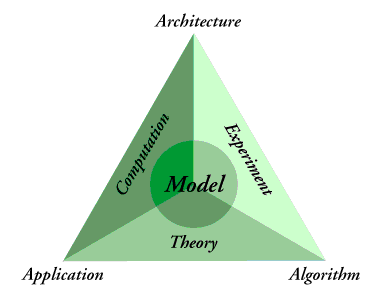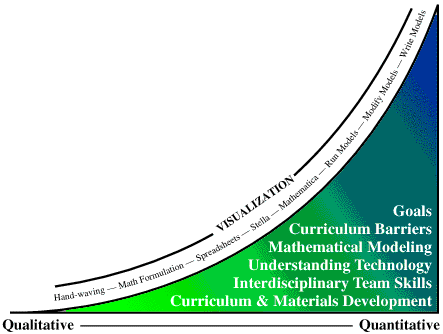 |
|
|
|
||||||||
|
|
Introduction The Shodor Education Foundation, Inc., is a non-profit 501(c)(3) education and research corporation dedicated to the reform and improvement of mathematics and science education by the incorporation of appropriate computational and communication technologies. Our name recalls the role of the hammer in the shodering process of making and applying gold leaf: we work to extend valuable educational resources and opportunities as far as possible.We place a special emphasis on enabling authentic science and mathematics explorations at all educational levels, developing numerical models and simulations integrated with the curriculum, professional development, and network access to support their use in learner-centered environments.
Our Educational Philosophy Modern, scientifically valid models must be built on a firm foundation drawing from computation, theory, and experiment. Confidence in the computational aspects of such models is built from proper matching of the computer algorithm and architecture to the application.  Helping educators, and thus students, to integrate theory, experimentation, and computation effectively requires increased sophistication in modeling and visualization, along with more powerful computational tools and technologies.  The learning curve for numerical modeling, as pictured here, may start with a qualitative "hand-waving" model -- for which the visualization is the model-- where simple theory and experimental data give rough insight into behavior. This insight may be refined by formulating the theory as mathematical models and then solving these models with a range of increasingly sophisticated tools, matching the tools to the complexity of the problem. The progression to more quantitative models begins with running other people's models, then modifying these models, and ultimately creating new models, tuning the numerical solutions and visualizations along the way. What affects the slope of the learning curve, moving from qualitative to quantitative modeling? The degree to which faculty have significant access to curriculum materials, the degree to which faculty understand interdisciplinary team skills, and their personal level of comfort with modeling and technology all play a role in their willingness and ability to integrate reform into the classroom. The Foundation is dedicated to facilitating this kind of reform in mathematics and science classrooms at all levels.
How We Can Help Interactive Teaching EnvironmentsThe Shodor Foundation staff and associates are developing interactive tools and simulations that enable and encourage exploration and discovery through observation, conjecture, and modeling activities. These Modeling and Simulation Technology for Education Reform (MASTER) tools are part of on-going collaborations with the National Center for Supercomputing Applications (NCSA) and other education organizations. Simulations and supporting materials developed by Foundation staff form the basis of international science collaborations presently demonstrating network technologies involving middle and high schools of the Department of Defense Education Activity (DoDEA).A growing portfolio of MASTER tools are being fully integrated with new collaboration tools and on-line research facilities to create authentic scientific experiences. All tools, simulations, and supporting curriculum materials are designed in accordance with the National Science Education Standards and the National Math Education Standards.
Internships and Faculty Seed GrantsBesides offering its own workshops and institutes, the Foundation supports a number of teacher preparation and enhancement projects. We fund a limited number of summer or semester internships each year for visiting students, teachers, and scientists. Seed grants are also available for exploring new ways of incorporating discovery-based activities into the science and mathematics curriculum. Faculty and students at all education levels are encouraged to submit requests for application information on these various opportunities.
Faculty EnhancementThe Shodor Foundation has been instrumental in the design and implementation of innovative seminars, workshops, and institutes to familiarize undergraduate faculty and K-12 teachers with Internet technologies and computational methods in science and mathematics, assisting them in incorporating these technologies into instruction and professional activities.As a follow-up of one NSF-funded institute, we formed the Carolinas Consortium for Computational Science to continue to assist the professional development of undergraduate faculty from undergraduate and minority institutions in North and South Carolina. The Shodor Education Foundation currently works with faculty, teachers, and teacher education programs in Maryland, Virginia, the Carolinas, Illinois, Texas, and the DoDEA system to support the use of computational and communication technologies in the curriculum. Please contact us to discuss how we can assist your professional development efforts.
Partnering for Campus-Wide ReformWe seek to partner with institutions and consortia to explore new approaches to effect interdisciplinary, campus-wide reform. The Foundation's efforts provide a framework on which to build and improve mathematics and science education reforms through authentic interactive learning environments which are learner-centered, group-oriented, and discovery-based. Current partners include the Associated Colleges of the South and the Maryland Virtual High School of Science and Mathematics. We are also working with a number of other public and private foundations, in coordination with the National Science Foundation, to promote and revitalize undergraduate education. If you would like to investigate such a partnership, please call or write us. |
|